The souls of the just are in the hand of God,
and no torment shall touch them.
Each year, the Church gives us the grace of remembering, and praying for, all of our loved ones who have gone before us, marked with the sign of faith, and all the dead whose faith is known to God alone. The Church is great in wisdom in giving us this feast every year. Because even though on this day, we might shed a few tears, still we will have the grace of remembering the ones who have given us life, given us wisdom, those who have been Christ to us, those who have made God’s love tangibly present in our lives.
Perhaps the deepest mystery of the human experience lies in the reality of life and death. Everyone has, or will, experience the death of loved ones, sometimes after a long life, sometimes far too soon, always with feelings of sadness, regret, pain, grief and perhaps even anger or confusion.
That’s how grief works. It might seem sometimes like it would have been better to live without love, but we know deep down that that’s not true. Sadness and even death are temporary; love is eternal. As the Church’s vigil for the deceased tells us, “all the ties of friendship and affection which knit us as one throughout our lives do not unravel with death.” We know that death only separates us for a short time, and even though there is that hole in our heart, the sadness that we feel is way better than never having loved at all, never having had our loved ones in our lives at all.
I want to pause here and speak a little about the reality of grief. Because, if there is one thing that we as a society do extremely poorly these days, it’s grieving. We rush through it and hope it’s all done before we have a chance to feel any kind of pain. That’s part and parcel of how things work in our world; we have a pill for every malady and a quick remedy for every pain, plagued with a whole host of horrifying side effects. And what’s important to know is that this is not how the Church teaches us to grieve. One of the most important reasons that we have All Souls Day each year is to give us the experience of remembering and grieving and healing. If you truly love, you will truly grieve, and not turn away from it.
The Church’s Catechism (989) teaches us: “We firmly believe, and hence we hope that, just as Christ is truly risen from the dead and lives for ever, so after death the righteous will live for ever with the risen Christ and he will raise them up on the last day.” And so we Christians never grieve as if we have no hope. The Church’s Liturgy echoes this hope in the third Eucharistic Prayer: “There we hope to enjoy for ever the fullness of your glory, when you will wipe away every tear from our eyes. For seeing you, our God, as you are, we shall be like you for all the ages and praise you without end, through Christ our Lord, through whom you bestow on the world all that is good.” One of the Prefaces to the Eucharistic Prayers for the Dead makes it very clear that this hope touches our experience of grieving: “In him the hope of blessed resurrection has dawned, that those saddened by the certainty of dying might be consoled by the promise of immortality to come (Preface I for the Dead).”
And so I have some tips on grieving that I hope you will find helpful:
- Don’t rush into the funeral. It’s hard to make all those difficult decisions at a moment’s notice. It’s great if you’ve talked about your wishes with your family, because it makes things easier. But if that hasn’t happened, the family would do well to take its time and avail itself of the resources of the funeral director and the church staff so that a funeral that adequately honors the deceased and comforts the living can be prepared.
2. Let other people help you. Even if you can do all the preparations, you don’t have to. Let the Church and others help you and minister to you in your time of grief. As a priest, I presided at my father’s funeral, but one of the priests who knew him preached the homily. I found that was very helpful to me in my own grieving.
3. Have a wake. A lot of people try to short-cut this one because they think it will be too painful. It will hurt a little, yes, but the comfort of others expressing their love for the deceased and for you will do so much to heal you in the time to come.
4. Don’t be afraid to shed tears. Anyone who has ever seen me preach at some funerals of people I’ve known especially well has seen me get choked up. You’ve probably seen me shed a tear when I’ve talked about my father or my grandparents in a homily. Tears heal us, and it’s good for other people, especially your children, to see you cry. They need to know that pain and sorrow are part of life so that they don’t feel like they’ve gone nuts when it happens to them. You aren’t doing anyone any favors by not allowing them to see you grieve.
5. Understand that grief doesn’t “go away.” Feelings soften with time, yes, but you will grieve your loved ones for many years to come, perhaps your whole life long. I still grieve for my grandparents who have been gone from my life for many, many years now. Sometimes those waves of grief will come up all of a sudden, without warning, kind of out of the blue. And that’s okay. Remember grief is a sign that we have loved, and loving is the most important thing we will ever do.
One of my most vivid childhood memories was when I was just about nine years old. My grandfather on my mother’s side, who had retired just a few months earlier, was diagnosed with cancer. There wasn’t so much that could be done about cancer in those days, so he wasn’t expected to live long. And so one night, as the oldest of the children, Mom and Dad came to my room to talk to me about Grandpa. That was the night I learned about life and death, sadness and grief, love and pain. We cried a bunch, hugged a lot, and talked about how we were going to miss him.
I went to the wake and funeral with my family, because that’s what we did when a loved one died. My parents could have shielded me from that experience in many ways, as so many parents do, but they chose not to, and I’m glad they made that decision. Death and grief aren’t things we actively seek, but we can’t be afraid to meet them head on, girded with faith, and confident of the hope we have in Christ Jesus.
Brothers and sisters, I can’t say this strongly enough: if we don’t learn to grieve, as early as possible, we will never ever truly love. We won’t want to invest ourselves in love because we won’t want to ever feel pain. Jesus so deeply invested himself in love that he suffered the pain of the cross for us, so as to open for us the way to resurrection. We have to be willing to suffer loss in order to gain anything truly glorious.
Even if the memories aren’t the best, and even if we struggle with the pain of past hurts mixed with the sorrow of grief, there is grace in grieving and remembering. Maybe this day can be an occasion of healing, even if it’s just a little bit. Maybe our tears, mixed with the saving Blood of Christ, can wash and purify our wounded hearts and sorrowful souls. And certainly our prayers are heard by our God who gives us healing and brings our loved ones closer to him, purifying them of any stain of sin gathered along the journey of life.
That pain that perhaps we feel won’t all go away today. We are left with tears and loneliness, and that empty place at the table, and that hole in our heart. But sadness and pain absolutely do not last forever, because death and sin have been ultimately defeated by the Blood of Christ. We can hope in the day that our hearts will be healed, and we will be reunited with our loved ones forever, with all of our hurts healed and relationships purified, in the kingdom that knows no end.
Eternal rest grant unto all of our departed loved ones, O Lord, and let perpetual light shine upon them. May the souls of all the faithful departed, through the mercy of God, rest in peace. Amen.
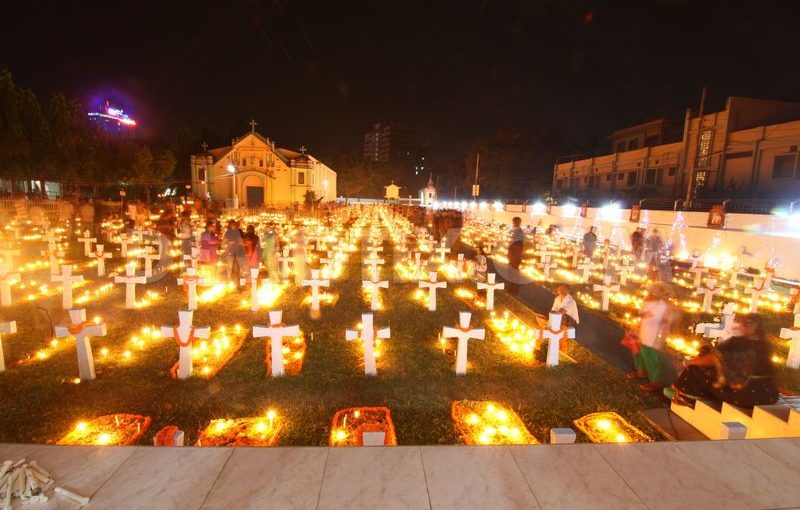
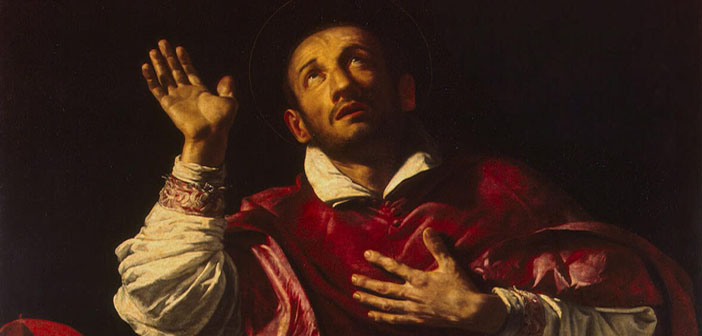

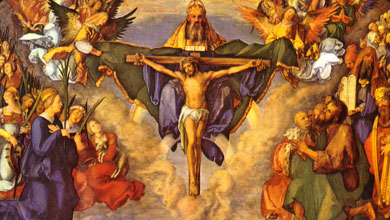



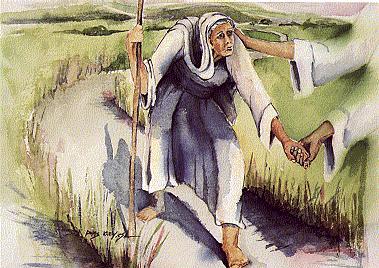
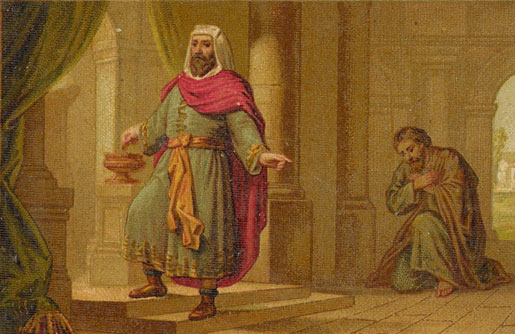
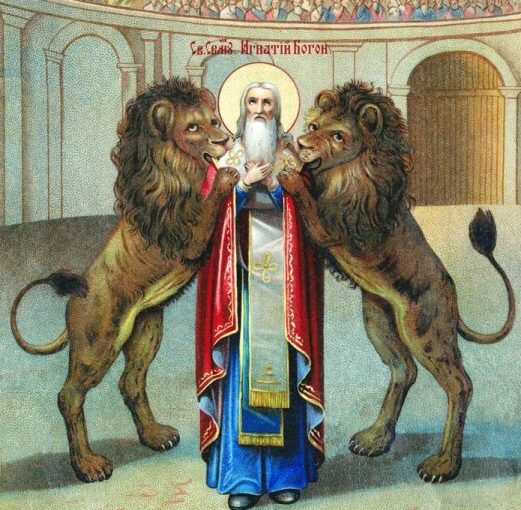
You must be logged in to post a comment.